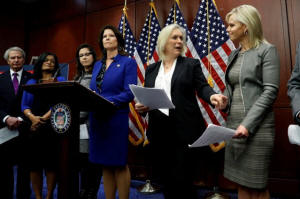|
Democrats seek to make Republican
scandals an election issue
 Send a link to a friend
Send a link to a friend
 [August 23, 2018]
By Susan Cornwell and John Whitesides [August 23, 2018]
By Susan Cornwell and John Whitesides
WASHINGTON (Reuters) - Democrats accused
congressional Republicans on Wednesday of enabling a growing culture of
corruption under U.S. President Donald Trump and planned to use the
issue to bolster their push to retake control of Congress in November's
elections.
The conviction and guilty plea on Tuesday of two former members of
Trump's inner circle put a spotlight on the Democratic argument that
Republicans have failed to check the excesses of corruption under Trump
- but that voters could do it for them.
"Washington Republicans are failing to hold themselves accountable to
the people for the corruption that has infected the party and has
infected the nation’s capital," said U.S. Representative Cheri Bustos,
co-chair of the messaging arm of the House of Representatives'
Democrats.
Some Democrats pounced on the scandals as a way to organize and raise
money for November when they are trying to pick up 23 seats in the House
and two seats in the Senate to gain majorities in both chambers and
blunt Trump's legislative agenda.
Democratic National Committee Chairman Tom Perez sent an email asking
for donations, saying: "The more Democrats we elect this November, the
better we will be able to hold this administration accountable."
At the DNC summer meeting in Chicago on Wednesday, Perez told party
members the election of Democrats would install "guard rails" against
Republican corruption.

Bustos said Democrats were seeking to make corruption a "co-equal" issue
with driving down healthcare costs, increasing wages through
infrastructure projects and providing new and stable leadership.
The conviction of former Trump campaign chairman Paul Manafort on tax
and bank fraud charges and the guilty plea of Trump's former personal
lawyer Michael Cohen on tax evasion, bank fraud and campaign finance
violations grew out of Special Counsel Robert Mueller's investigation of
potential Russian meddling in the 2016 U.S. election and whether the
Trump campaign conspired with Moscow to influence the outcome.
Russia has denied interfering and Trump has said there was no collusion.
Cohen said Trump told him to arrange hush money for two women who said
they had affairs with Trump - and reimbursed him with campaign cash.
White House press secretary Sarah Sanders said on Wednesday that Cohen's
plea deal did not implicate the president in a crime. Trump, who has
denied the affairs, has insisted he paid Cohen out of personal funds and
that the payments were not intended to benefit his campaign but to
resolve a personal matter.
"Corruption is a big issue when I go around the district," said Democrat
Janet Garrett, who is challenging U.S. Representative Jim Jordan, a
conservative Ohio Republican and Trump ally who has called for the
impeachment of Deputy Attorney General Rod Rosenstein for his oversight
of the Mueller probe.
“He’s definitely an enabler of corruption, because he is willing to
sacrifice the truth on the altar of self-interest," Garrett said of
Jordan, who is fighting his own scandal. He has denied allegations that
he knew about sexual harassment of wrestlers at Ohio State University
and did nothing about it.
[to top of second column]
|

Rep. Cheri Bustos speaks at a press conference calling for an end to
forced arbitration as Sen. Kirsten Gillibrand greets Gretchen
Carlson on Capitol Hill in Washington, U.S., December 6, 2017.
REUTERS/Aaron P. Bernstein/File Photo

DEMOCRATS WILL 'OVERREACH'
Republican congressional leaders avoided criticizing Trump after the
outcome of the Manafort and Cohen cases.
John Cornyn, the No. 2 Senate Republican, said he expected Democrats
would overplay their hand and launch a contentious drive to remove
Trump from office.
“I have some confidence that our Democratic friends are going to
overreach, and this will be all about impeachment," he told
reporters in the Capitol.
Republican Senator Mike Rounds, who is not up for re-election this
year, told reporters it was tough to get the party's message through
to voters over the din of the scandals.
"We're actually getting our work done in the Senate, and I know
that’s not getting a lot of attention, but it will at some point,"
Rounds said.
The Cohen and Manafort news came amid a spiral of corruption charges
against Republicans, including an indictment on Tuesday against U.S.
Representative Duncan Hunter for allegedly spending campaign money
on personal expenses.
Hunter, who is seeking re-election in California, denied the
allegations and suggested in a statement on Wednesday that it was
politically motivated given the timing of the charges so close to
the election.
The Hunter case followed the recent indictment of U.S.
Representative Chris Collins, a Republican who was one of Trump's
first supporters, on securities fraud charges involving the use of
inside information. Collins also denied wrongdoing but dropped out
of his race in New York.
Democrats have used the corruption issue successfully before,
winning House control in 2006 after financial and sexual scandals
involving prominent Republicans. But other issues, such as the
unpopularity of Republican President George W. Bush and the Iraq
war, were also important that year.

"Democratic candidates already have been running on ethics, public
service and independent leadership," said a Democratic strategist
who works with candidates in battleground districts. "This just
strengthens their case."
(Reporting by Susan Cornwell and John Whitesides; Additional
reporting by Amanda Becker in Washington and Tim Reid in Chicago;
Editing by Colleen Jenkins and Peter Cooney)
[© 2018 Thomson Reuters. All rights
reserved.]
Copyright 2018 Reuters. All rights reserved. This material may not be published,
broadcast, rewritten or redistributed.
Thompson Reuters is solely responsible for this content. |